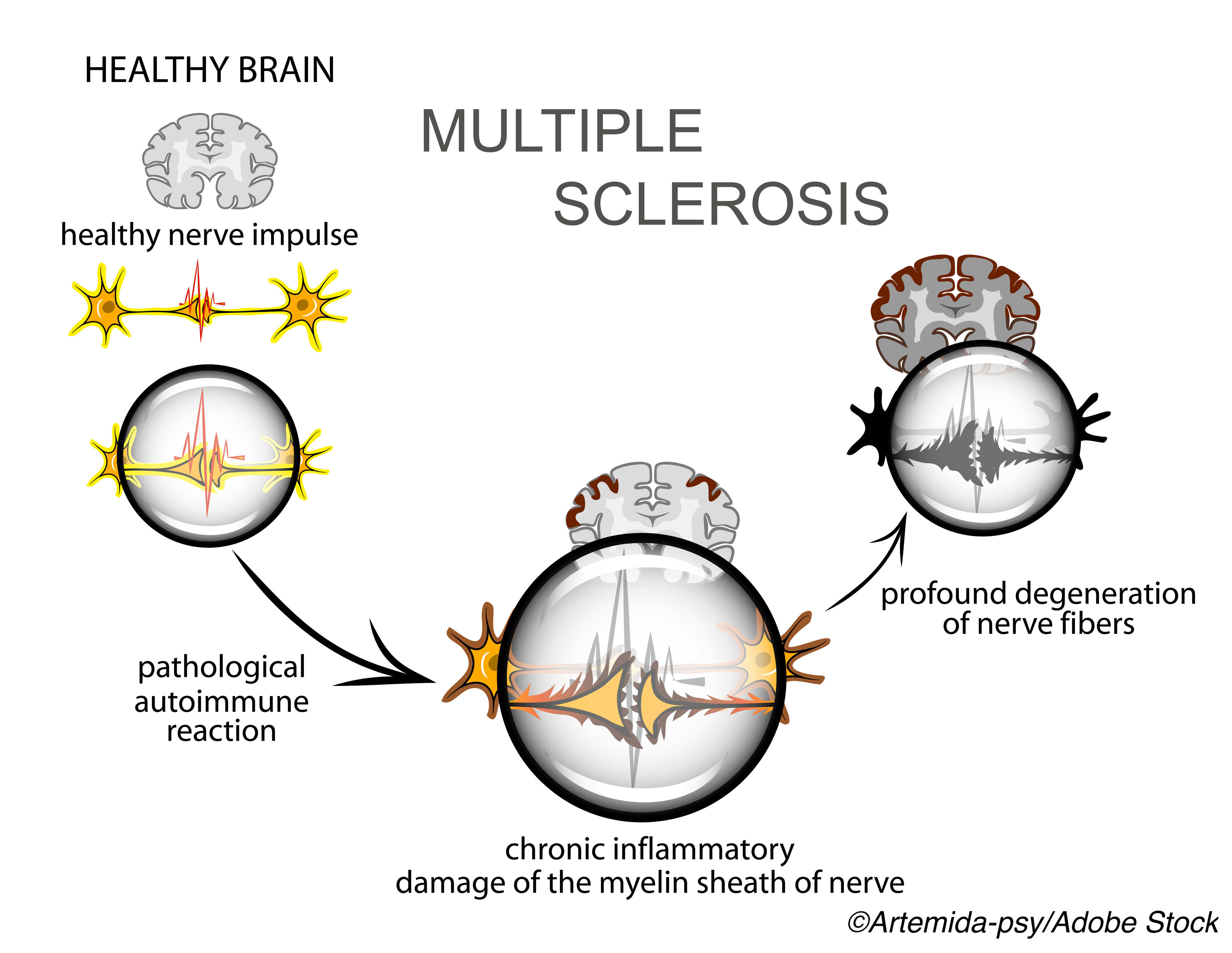Multiple sclerosis (MS) patients treated with disease-modifying therapies had reduced accrual of disability, an observational modeling study showed.
“This study provides class IV evidence that for patients with relapsing-remitting multiple sclerosis, long-term exposure to immunotherapy prevents neurological disability,” wrote Tomas Kalincik, MD, PhD, of the University of Melbourne in Australia, and co-authors in Neurology.
The researchers used data from 14,717 patients in the MSBase registry to develop their model. Patients had relapsing or progressive forms of MS, or clinically isolated syndrome. They had been followed for 1 or more years, had three or more visits, and had been exposed to MS therapy at least part of the time during follow-up.
Because clinical follow-up in each patient might include both treated and non-treated periods, each patient could contribute data to modeled “pseudo-cohorts” defined as treated or nontreated at different times throughout follow-up. A model based on demographics, clinical factors, and outcomes characterized the pseudo-cohorts, allowing treated versus nontreated outcomes to be compared.
During the treated periods, patients were less likely to experience relapses (HR 0.60, 95% CI 0.43-0.82, P=0.0016), worsening of disability (HR 0.56, 95% CI 0.38-0.82, P=0.0026), and progress to Expanded Disability Status Scale (EDSS) step 6 (0.33, 95% CI 0.19-0.59, P=0.00019).
In a subset of 1,085 patients with 15 or more years of follow-up, treated patients were less likely to experience relapses (HR 0.59, 95% CI 0.50-0.70, P=10-9) and worsening of disability (0.81, 95% CI 0.67-0.99, P=0.043).
Previous studies about long-term disability outcomes associated with MS treatment have yielded mixed findings, Kalincik and colleagues noted.
“Extension studies and randomized clinical trials suggested that timely immunotherapy may delay conversion to clinically definite MS, accumulation of disability, and death,” they wrote. “However, observational studies reported conflicting results.”
“Comparisons of observational data between treated and untreated patients are obfuscated by reverse causality, and randomized clinical trials that would address this question are neither feasible nor ethical,” they added. “Therefore, this study used observations of relapses and worsening/improvement of disability analyzed with causal inference methods to adjust for time-dependent confounding and treatment indication bias in longitudinal data.”
A 2015 review and meta-analysis of therapy for relapsing-remitting MS concluded that “insufficient evidence is available to evaluate treatments for the prevention of irreversible disability worsening,” and identified two major concerns: benefit of treatments beyond 2 years was uncertain, and short-term trials “do not provide useful evidence in order to obtain a reliable risk profile of treatments.” The authors called for randomized head-to-head trials of active agents, mandatory long-term follow-up of original trial cohorts, and studies to assess the medium- and long-term comparative benefit and safety of various treatments.
In this analysis, Kalincik and colleagues used data from MSBase, an international observational MS cohort with patients mainly from academic centers. Disability accumulation (or improvement) was defined as a change in EDSS by one step (1.5 steps if baseline EDSS=0, 0.5 steps if baseline EDSS>5.5), confirmed by subsequent EDSS scores over 12 or more months.
Models in this longitudinal study were continuously readjusted for patient age, sex, pregnancy, date, disease course, time from first symptom, prior relapse history, disability, and MRI activity.
At the first study visit, the population was 71% female, with a mean age of 36 and a mean EDSS of 2 (minimal disability in one functional system).
The most represented therapies were interferon β/glatiramer acetate (59% of follow-up time), natalizumab (5%), and fingolimod (4%).
Patients were exposed to immunotherapies for 69% of the prospectively recorded cumulative follow-up of 102,978 patient-years, with median per-patient follow-up of 6 years. For those with 15 or more years follow-up, exposure to therapy was 63% over a median follow-up of 17 years.
Within 15 years from first visit, 13% of the treated cohort and 41% of the untreated cohort reached EDSS step 6, requiring a cane or crutch to walk 100 meters.
While analysis considering relapsing-remitting MS confirmed the primary analysis, analysis for progressive forms found no differences in disability accumulation or disability improvement for treated and untreated pseudo-cohorts.
“In keeping with our previous studies, we did not observe an overall effect of pooled immunotherapies in non-selectively treated cohorts with progressive disease forms,” Kalincik and co-authors observed. “However, this observation does not rule out the possibility that some therapies can slow down progression of disability in progressive MS, especially where episodic inflammatory activity is superimposed.”
Limitations of this analysis include those inherent to observational studies. The findings may apply only to patients treated at academic centers.
The study provides “evidence that long-term exposure to immunotherapy not only reduces relapse activity but also prevents at least a fifth of neurological disability worsening in patients with relapsing-remitting MS,” Kalincik and colleagues concluded.
“In early MS, accelerated recovery from previously accrued disability can be observed early after commencing immunotherapy,” they added. “Therefore, sustained, long-term immunotherapy from early stages of MS is advisable as a strategy to preserve patients’ neurological capacity over the long term.”
-
Multiple sclerosis (MS) patients treated with disease-modifying therapies had reduced accrual of disability, an observational modeling study showed.
-
Analysis considering only relapsing-remitting MS confirmed the primary analysis done for both relapsing and progressive forms of MS. Analysis limited to progressive forms found no differences in disability accumulation or disability improvement for treated and untreated groups.
Paul Smyth, MD, Contributing Writer, BreakingMED™
This study was financially supported by National Health and Medical Research Council of Australia and Biogen.
Kalincik reported relationships with BioCSL, Biogen, Genzyme-Sanofi, Merck/EMD, Novartis, Roche, and Teva.
Cat ID: 130
Topic ID: 82,130,730,130,36,192,925



